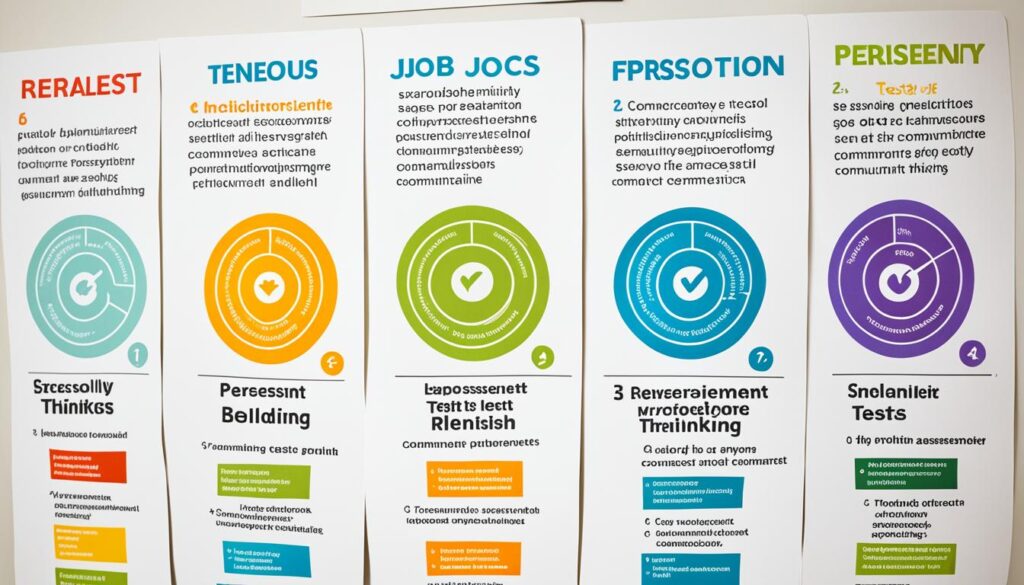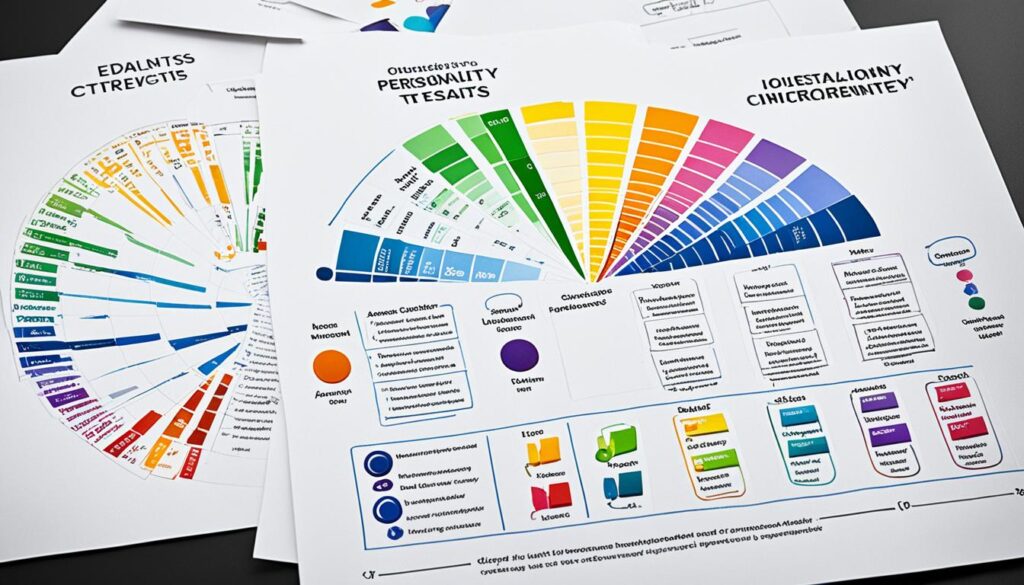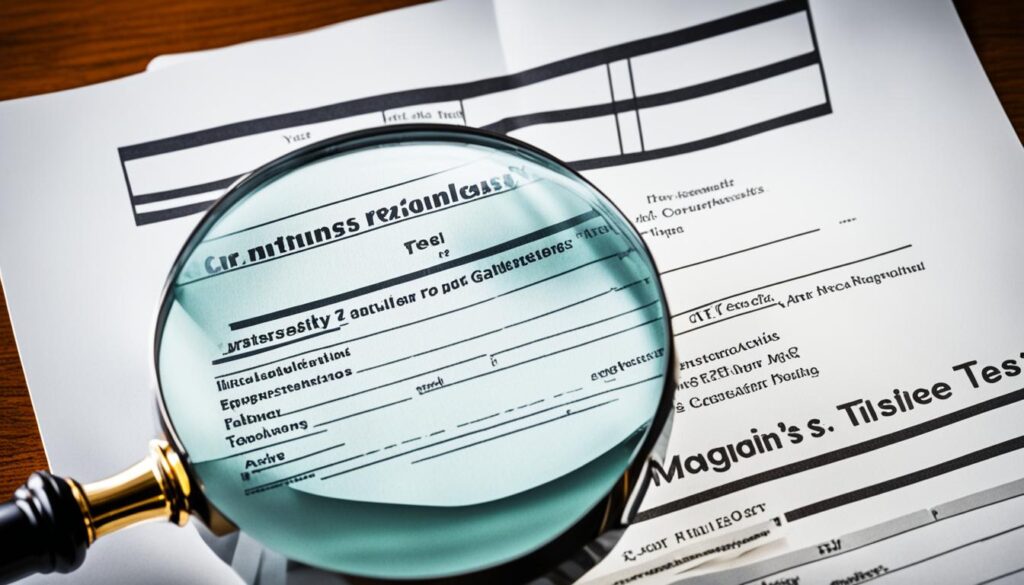Were you aware that 70% of employers utilize personality tests when evaluating candidates for job positions? Personality assessments have become a crucial aspect of the recruitment process, offering valuable information on a candidate’s characteristics, abilities, and fit for a particular role. Employers understand the importance of evaluating personality compatibility to promote a productive and cohesive work atmosphere.
Key Takeaways:
- Personality tests are widely used by 70% of employers during the job application process.
- These tests offer valuable insights into a candidate’s behavioral traits and suitability for a specific role.
- Employers utilize personality tests to ensure a productive and harmonious work environment.
- Personality compatibility plays a crucial role in screening and selecting the right candidates.
- Understanding a candidate’s personality traits can lead to higher engagement and lower turnover rates.
What Is a Personality Test for Recruitment?
A personality test for recruitment is an essential tool used by employers and recruiters to evaluate and screen candidates, ensuring that they possess the character traits required for specific positions. These tests provide valuable insights into candidates’ personalities, helping employers determine their suitability for the job and ensuring a harmonious fit within the company culture. By assessing candidates’ behaviors, skills, and characteristics, personality tests become indispensable in identifying individuals who can perform their roles effectively and stay engaged in the workplace.
According to the Society for Human Resource Management (SHRM), it is estimated that around one-third of HR specialists incorporate personality tests during the recruitment and interview process for executive positions, highlighting their significance and widespread use in the hiring process.

Advantages of Personality Tests in Job Applications
Personality tests offer several advantages in the job application process. They provide essential information about candidates’ qualities that directly impact their fit within the company culture, suitability for specific positions, and team performance. These tests reveal insights into candidates’ motivations, thinking processes, communication preferences, and attitudes. Here are some key advantages of utilizing personality tests in job applications:
- Essential Information: Personality tests provide valuable information about candidates’ character traits and behavioral tendencies. This information helps employers make informed decisions, ensuring candidates have the necessary qualities to succeed.
- Convenience: Personality tests can be easily administered online, offering convenience for both candidates and employers. They can be completed at any time and provide instant results, allowing for efficient evaluation of candidates.
- Saves Time and Money: By using personality tests, employers can save time and effort in hiring. These tests allow them to vet candidates for long-term employment beforehand, preventing potential mismatches and the associated turnover costs.
Providing Essential Information
“Personality tests provide valuable insights into candidates’ motivations, thinking processes, communication preferences, and attitudes.
Personality tests go beyond traditional resume and interview assessments. They offer deep insights into candidates’ personality traits, helping employers understand their potential fit within the organization and specific job roles. By gathering essential information about candidates’ qualities, employers can make more accurate predictions about their job performance and long-term compatibility within the company.
Convenience in the Hiring Process
“Personality tests offer convenience by being easily administered online with instant results.
In today’s digital landscape, personality tests have become increasingly convenient. They can be easily administered online, eliminating manual paperwork and in-person assessments. Candidates can complete the tests at their convenience, freeing time for employers and candidates. Additionally, instant results allow employers to evaluate candidates and move forward in the selection process promptly.
Saving Time and Money
“Personality tests save time and money by preventing potential mismatches and reducing turnover costs.”
Hiring new employees involves significant investment in terms of time and resources. Personality tests help save time and money by providing insights into candidates’ character traits before the hiring decision is made. By identifying potential mismatches early on, employers can avoid the drop in productivity and increased turnover rates caused by placing employees in roles that don’t align with their personality traits.

Personality tests have become a valuable tool in the hiring process, offering essential information, convenience, and cost savings. From revealing key insights to streamlining the evaluation process, these tests empower employers to make more informed decisions and ensure the right fit between candidates, positions, and company culture.
Types of Personality Tests in Recruitment
Regarding recruitment, various types of personality tests are commonly used to assess candidates’ traits and suitability for specific roles. These tests provide valuable insights into individuals’ characteristics and behaviors, helping employers make informed hiring decisions. Let’s explore some of the most widely known personality tests:
Big Five Personality Test
The Big Five Personality Test is a widely used assessment that measures five broad dimensions of personality:
- Openness to experience
- Conscientiousness
- Extraversion
- Agreeableness
- Neuroticism
This test gives employers a comprehensive understanding of candidates’ personalities and how they may fit into different work environments.
Myers-Briggs Type Indicator (MBTI)
The Myers-Briggs Type Indicator (MBTI) is another popular personality test that assesses individuals based on four dichotomies:
- Extraversion vs. Introversion
- Sensing vs. Intuition
- Thinking vs. Feeling
- Judging vs. Perceiving
These dichotomies combine to form 16 possible personality types, giving employers insights into candidates’ preferences and behaviors.
DISC Personality Test
The DISC Personality Test focuses on evaluating an individual’s preferred behavioral styles:
- Dominance
- Influence
- Steadiness
- Compliance
This test helps employers assess how candidates may approach various tasks, communicate with others, and handle challenges in the workplace.
Enneagram Personality Test
The Enneagram Personality Test identifies nine personality types, each characterized by core motivations, fears, desires, and growth points. It offers a deeper understanding of individuals’ identities and behaviors, aiding employers in determining their potential fit within an organization.
Employers may choose to use one or a combination of these personality tests, depending on their hiring needs and the insights they seek from candidates. Each test provides unique perspectives into an individual’s personality, helping employers make more accurate assessments.

| Personality Test | Key Dimensions |
|---|---|
| Big Five Personality Test | Openness to experience, conscientiousness, extraversion, agreeableness, neuroticism |
| Myers-Briggs Type Indicator (MBTI) | Extraversion vs. Introversion, Sensing vs. Intuition, Thinking vs. Feeling, Judging vs. Perceiving |
| DISC Personality Test | Dominance, Influence, Steadiness, Compliance |
| Enneagram Personality Test | Core motivations, fears, desires, growth points |
Personality Tests Suitable for Recruitment
Not all personality tests are suitable for recruitment purposes. Employers need to choose validated tests to make informed hiring decisions and provide reliable and valid results. When selecting personality tests, we recommend considering the following:
- Caliper Profile: The Caliper Profile is an assessment that evaluates 22 strong traits and reveals motivations that relate to job positions. It provides valuable insights into candidates’ personality traits and alignment with specific roles.
“The Caliper Profile offers a comprehensive understanding of candidates’ strengths and motivations, helping employers identify individuals who possess the qualities necessary for success in the desired position.”
- Hogan Personality Inventory (HPI): The Hogan Personality Inventory focuses on an individual’s normal or positive personality traits. It provides employers with data that can help them understand candidate behaviors, leadership styles, and potential for organizational success.
“The Hogan Personality Inventory enables employers to gain insights into candidates’ personality strengths and weaknesses, aiding in the identification of individuals who align with the organization’s values and culture.”
- HEXACO Personality Inventory: The HEXACO Personality Inventory evaluates six crucial aspects of personality: honesty-humility, emotionality, extraversion, agreeableness, conscientiousness, and openness to experience. This assessment provides a comprehensive perspective on candidates’ character traits.
“The HEXACO Personality Inventory helps employers gauge candidates’ personality traits and determine their suitability for specific roles within the organization.”
Employers can gain deeper insights into candidates’ personalities and make more informed hiring decisions by choosing reliable and validated personality tests like the Caliper Profile, Hogan Personality Inventory, and HEXACO Personality Inventory.

Advantages of Using Personality Tests in the Hiring Process
Incorporating personality tests into the hiring process offers several advantages. These tests streamline the hiring process, allowing quicker and more efficient decision-making. Using personality tests, we can identify candidates likely to excel in their job roles, leading to increased productivity within the organization. Moreover, these tests help us create a better sense of teamwork and collaboration among employees, as we can hire individuals compatible with the company culture. Personality tests provide valuable insights into candidates’ decision-making styles, conflict resolution abilities, and attitudes, empowering us to make more informed hiring decisions.

| Advantages of Personality Tests in the Hiring Process |
|---|
| 1. Streamlines the hiring process |
| 2. Identifies candidates likely to perform well in their roles |
| 3. Increases productivity within the organization |
| 4. Enhances teamwork and collaboration |
| 5. Provides valuable insights into decision-making, conflict resolution, and attitudes |
Disadvantages of Using Personality Tests in the Workplace
While personality tests offer a range of advantages, it is essential to consider the potential disadvantages they may bring. Understanding these drawbacks can help organizations make informed decisions when using personality tests in hiring.
Screening Out Qualified Candidates
One of the disadvantages of personality tests is the potential for screening out qualified candidates who possess valuable skills and experience but may not exhibit the mainstream personality traits associated with specific jobs. As these tests often focus on specific personality characteristics, there is a risk of excluding individuals who could contribute significantly to the organization.
Flawed Results
Personality tests rely on self-reporting, and candidates may be influenced by what they perceive the employer wants, leading to inaccurate results. Moreover, some tests may not have been specifically designed for hiring purposes, potentially resulting in skewed outcomes. It’s crucial to acknowledge the limitations of these tests and use them as one piece of the larger hiring puzzle.
Legal Risks
Another consideration is the potential legal risks associated with certain types of personality tests. Using tests that can result in discrimination claims or violate equal employment opportunity guidelines can pose significant challenges for organizations. It’s vital to ensure that the tests used are fair, unbiased, and comply with legal requirements to minimize the risk of legal issues.
Recognizing the disadvantages of personality tests allows organizations to make more informed decisions when incorporating them into the hiring process. By considering these drawbacks and implementing strategies to mitigate their impact, businesses can navigate potential pitfalls and maximize the benefits of personality testing.

Mitigating Legal Risks in Personality Testing
Ensuring legal compliance is a top priority when using personality tests in the hiring process. Employers must take steps to mitigate potential legal risks and protect against claims of discrimination. Here are some key strategies to consider:
1. Test Validity and Reliability
Choose personality tests that have been thoroughly validated and recognized as reliable job performance predictors. Validity refers to the extent to which a test accurately measures what it claims to measure, while reliability ensures consistent and stable results over time. By selecting validated tests, you can strengthen the defensibility of your hiring decisions.
2. Internal Analysis with Legal Counsel
Conduct an internal analysis of the personality tests you plan to use in collaboration with legal counsel. This analysis can help identify potential risks or biases in the tests’ design, administration, or interpretation. Legal counsel can guide compliance with equal employment opportunity (EEO) regulations and ensure fair and lawful assessment practices.
3. Review EEOC Lawsuits
Stay informed about past Equal Employment Opportunity Commission (EEOC) lawsuits related to personality tests. Reviewing these cases can provide valuable insights into legal challenges and help ensure your testing practices align with legal requirements. Remove any test questions or practices deemed discriminatory in previous cases.
4. Minimize Reliance on Personality Tests
Avoid over-reliance on personality tests as the sole determinant of hiring decisions. Instead, consider them as just one component of a comprehensive hiring process. Incorporating other assessment methods, such as interviews, work samples, and reference checks, allows you to gather a more holistic view of candidates’ qualifications and job fit.
“To mitigate legal risks in personality testing, employers must prioritize test validity and reliability, conduct internal analyses with legal counsel, review EEOC lawsuits, and minimize reliance on personality tests.”
By implementing these strategies, employers can mitigate legal risks associated with personality testing and ensure fair and objective hiring practices.
| Strategies to Mitigate Legal Risks in Personality Testing |
|---|
| 1. Test Validity and Reliability |
| 2. Internal Analysis with Legal Counsel |
| 3. Review EEOC Lawsuits |
| 4. Minimize Reliance on Personality Tests |

Conclusion
Personality tests have become integral to the job application process, providing valuable insights into candidates’ behaviors, skills, and characteristics. These tests offer numerous advantages, including providing essential information to make better hiring decisions, the convenience of administration, and the ability to predict candidates’ behavior on the job. However, it is important to be mindful of the disadvantages, such as the potential exclusion of qualified candidates and legal risks.
To navigate these challenges, employers should use validated and reliable personality tests specifically designed for hiring. Conducting internal analyses, with legal counsel if necessary, can help identify potential risks and ensure compliance with equal employment opportunity regulations. It is also important to minimize reliance on personality tests and consider them as just one component of the hiring process.
By harnessing the power of personality tests effectively, employers can gain valuable insights into candidates, make more informed decisions, and create a workforce well-suited to the organization’s culture and job requirements.
How Can Personality Test Insights from Job Interviews Impact Job Applications?
Understanding personality test insights from job interviews can greatly impact job applications. Employers use these insights to assess a candidate’s fit for a role, team dynamics, and overall company culture. By recognizing and addressing these insights, applicants can showcase their strengths and improve their chances of landing the job.
FAQ
Why are personality tests important in job applications?
Personality tests provide essential insights into candidates’ behaviors and characteristics, helping employers identify individuals who are a good fit for specific positions and company culture. They ensure a higher likelihood of success and reduce turnover.
What is a personality test for recruitment?
A personality test for recruitment is an assessment tool used by employers to screen candidates based on their character traits and suitability for specific job roles. It helps identify individuals who are likely to succeed and align well with the organization.
What are the advantages of using personality tests in job applications?
Personality tests provide valuable information about candidates’ qualities, enhance the hiring process efficiency, save time and money, and contribute to improved teamwork and productivity in the workplace.
What types of personality tests are commonly used in recruitment?
Commonly used personality tests include the Big Five Personality Test, Myers-Briggs Type Indicator (MBTI), DISC Personality Test, and Enneagram Personality Test, each assessing different aspects of individuals’ personality traits.
What personality tests are suitable for recruitment?
Personality tests suitable for recruitment include the Caliper Profile, Hogan Personality Inventory (HPI), and HEXACO Personality Inventory, which are psychometrically validated and provide reliable and valid results in predicting job performance.
What are the advantages of using personality tests in the hiring process?
Using personality tests in the hiring process leads to quicker and more efficient decision-making, helps identify candidates who will perform well in their roles, and enhances teamwork and collaboration among employees.
What are the disadvantages of using personality tests in the workplace?
Personality tests may screen out qualified candidates who don’t fit mainstream personality traits associated with certain jobs. Candidates may also respond based on what they think the employer wants, leading to inaccurate results. There are also potential legal risks and concerns about discrimination.
How can employers mitigate legal risks in personality testing?
Employers can mitigate legal risks by using validated and reliable personality tests, conducting internal analyses to identify potential risks, reviewing Equal Employment Opportunity Commission (EEOC) lawsuits, and minimizing reliance on personality tests as the sole hiring criterion.
What is the role of personality tests in the job application process?
Personality tests provide targeted insights into candidates’ behaviors, skills, and characteristics, helping employers make more informed hiring decisions and ensure a good fit within the organization.









